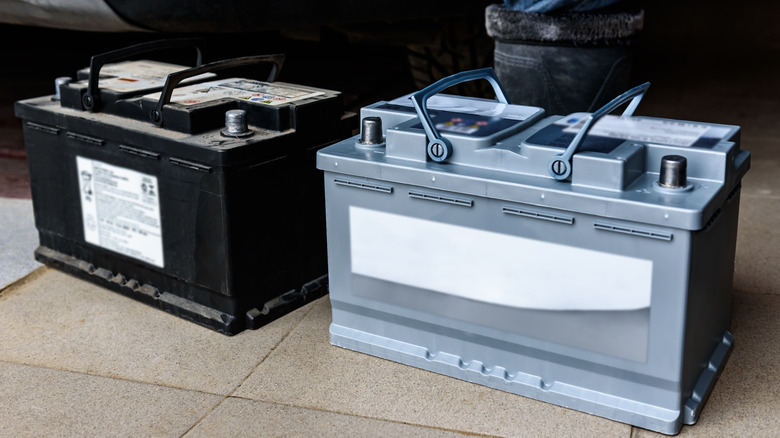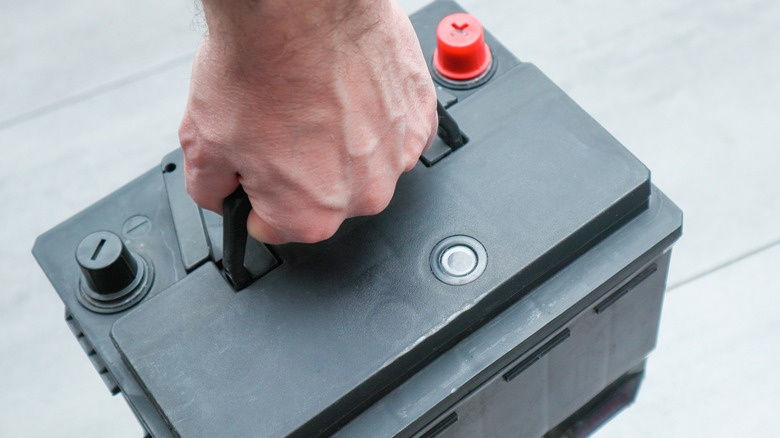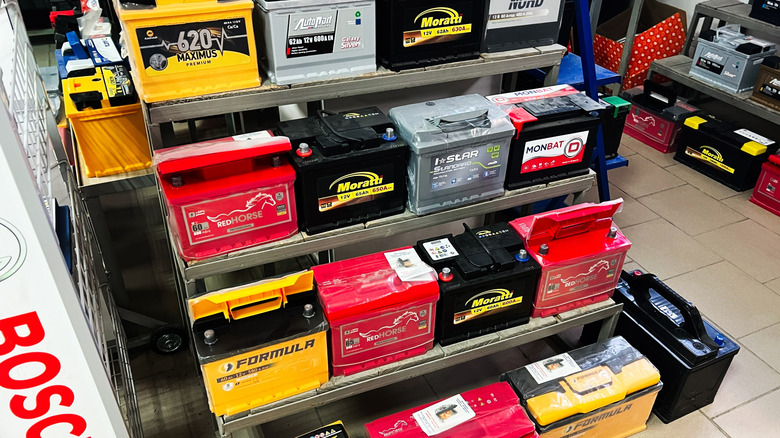Should You Avoid Leaving A Car Battery On A Concrete Floor?
On the surface, a car battery seems like a solid, relatively indestructible element of an automobile. They're dense, heavy, and don't always show the clearest signs of aging. With that said, these components are far from invincible and very much able to age, decay, and malfunction like any other car part. After all, there are multiple signs that your car battery needs to be replaced. At the same time, what is there to say about car batteries that aren't in use and are stored away? More specifically, what can one expect from a car battery set on a concrete garage floor?
The idea that storing a car battery on a concrete floor is bad for it is quite dated. Way back in the day, when car batteries were comprised of more fragile materials like wood and glass, wet concrete was a threat. The wood could soak up moisture, swelling, and damaging the cells, rendering the battery useless. Throughout the decades, though, car batteries and their casings have become more heavy-duty, comprised of thick plastic and rubber. These materials aren't subject to the same swelling and subsequent damage as their predecessors, so they're entirely safe to store on a concrete floor.
As solid and storage-ready as modern car batteries are, proper storage is crucial. Though they're game for prolonged exposure to concrete floors, there are some storage dos and don'ts that should be considered.
Proper car battery storage is important
Just because concrete floors get a pass when it comes to car battery storage doesn't mean where you put one isn't important. For instance, the conditions your battery is subjected to can either keep it safe and functional or result in efficiency loss or total failure. You never want to keep a battery in an environment that's too hot or too cold. Its storage area should, ideally, remain consistently cool, between 40 and 60 degrees Fahrenheit. It should be kept out of direct sunlight as well to prevent it from overheating, and it shouldn't be exposed to excessive moisture. While it won't soak up water, dampness can lead to corrosion.
Additionally, the treatment of your battery for storage should be considered as well. If you have a lead-acid battery– the type that needs a specific kind of water — you want to ensure that it's stored at a full charge. If it's stored at only a partial charge, there's a strong possibility it will deteriorate in short order. Meanwhile, lithium-ion batteries go in the opposite direction, with storage at a partial, roughly half-charge being the way to go. In any case, a battery maintainer or trickle charger can be used to keep your batteries where they need to be power-wise. Also, a coating of battery terminal protector or petroleum jelly should be used on the terminals to prevent corrosion, as corrosion is one of many potential causes for a dashboard battery light to turn on.
While these practices will work for storing batteries for any amount of time, the protocols for long-term and short-term storage aren't entirely the same. Depending on the situation, you should keep an eye on your battery or batteries accordingly.
Short and long term battery storage call for different measures
If you plan to store one or more car batteries on a concrete floor, or any surface for that matter, you should be mindful of how long you plan to do so. On the short-term end of the storage scale, ranging from a few weeks to a few months, there's not a whole lot to do. Take care of the aforementioned treatment to-dos, make sure the batteries are clean and in a suitable environment, and charge them adequately before storing them away. You should check in on them here and there, ensuring they're dry, intact, and clean, but unless they're going to remain in storage beyond a few months, there's not a lot of repetitive maintenance to be done.
As for long-term storage, ranging from a year to around three to five, depending on the battery type — lithium-ion batteries tend to last the longest in storage — you should take a more active role. Over the years in storage, batteries will lose charge and overall capacity, so there's more to do than occasionally looking them over. You should recharge them periodically and clean them every few months at the very least to keep them in the best condition possible. Once they need to be used, check the charge level, look them over for any kind of damage, and recharge or refill them as needed before installation.
Car battery storage is more complicated than one might think, but it's not hard to do right. Contrary to popular belief, there's a lot more to be concerned with than whether the floor they're left on is concrete.


